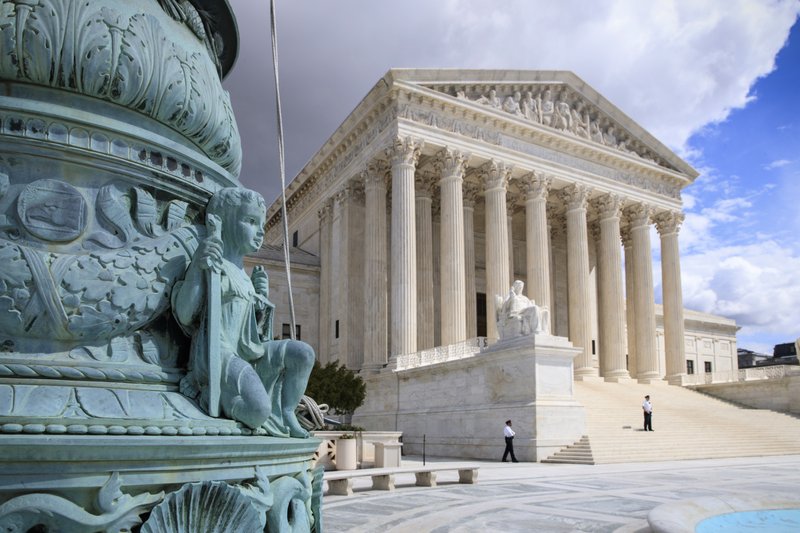WASHINGTON -- The Supreme Court ruled Wednesday that President Donald Trump's administration can enforce tight restrictions on refugees but left in place a weakened travel ban that includes grandparents among relatives who can help visitors from six mostly Muslim countries enter the U.S.
The justices' move was in response to the administration's appeal of a federal judge's ruling last week. U.S. District Judge Derrick Watson ordered the government to allow in refugees formally working with a resettlement agency in the United States. Watson also vastly expanded the family relations that refugees and visitors can use to get into the country.
The high court blocked Watson's order as it applies to refugees for now, but not the expanded list of relatives. Wednesday's unsigned, one-paragraph order gave no reasoning for the Supreme Court's action.
The justices said the federal appeals court in San Francisco should now consider the appeal. It's not clear how quickly that will happen.
[U.S. SUPREME COURT: More on current justices, voting relationships]
In the meantime, though, up to 24,000 refugees who already have been assigned to a charity or religious organization in the U.S. will not be able to use that connection to get into the country.
"This ruling jeopardizes the safety of thousands of people across the world, including vulnerable families fleeing war and violence," said Naureen Shah, Amnesty International USA's senior director of campaigns.
That part of the court's ruling was a victory for Trump, who first rolled out a ban on travelers and refugees a week after his inauguration, prompting a legal fight that has raged ever since.
But the Supreme Court also denied the administration's request to clarify the ruling last month that allowed the administration to partially reinstate a 90-day ban on visitors from Iran, Libya, Somalia, Sudan, Syria and Yemen and a 120-day ban on refugees from anywhere in the world.
The court's ruling exempted a large swath of refugees and travelers with a "bona fide relationship" with a person or an entity in the U.S. The justices did not define those relationships but said they could include a close relative, a job offer or admission to a college or university.
The Trump administration interpreted the Supreme Court's requirement of a "close familial relationship" to be a parent, spouse, fiance, son or daughter, sibling, son-in-law or daughter-in-law in the United States.
Watson's order added grandparents, grandchildren, brothers-in-law, sisters-in-law, aunts, uncles, nieces, nephews and cousins to the list. The expanded list of relatives remains in effect, and the State Department already has instructed diplomats to use the broader list when considering visa applicants from the six countries.
"Common sense, for instance, dictates that close family members be defined to include grandparents," Watson wrote in his ruling. "Indeed, grandparents are the epitome of close family members. The government's definition excludes them. That simply cannot be."
Watson also ruled that refugees with an assurance from a resettlement agency are exempt from the ban.
The Justice Department asked the Supreme Court to stay Watson's ruling.
The administration said in its brief to the court that Watson's interpretation of what kinds of family relationships qualify "empties the court's decision of meaning, as it encompasses not just 'close' family members, but virtually all family members. Treating all of these relationships as 'close familial relationships' reads the term 'close' out of the court's decision."
The administration added that Watson's ruling would cover virtually all refugees.
The state of Hawaii, which has led the challenge of the travel ban, told the justices that the government's argument was "nonsense." Any rule that maintained grandparents are not part of a close familial relationship was suspect as applied both to those who sought visas and to refugees, the state said in its brief to the court.
"That argument is as wrong as it sounds, and nothing in this court's opinion, the immigration laws, or common sense supports it," the state wrote.
Hawaii Attorney General Doug Chin said in a statement that the court's order Wednesday "confirms we were right to say that the Trump administration over-reached in trying to unilaterally keep families apart from each other."
The National Immigration Law Center said that while "family unity won today," it will continue to litigate "to ensure that refugees can find the shelter they were offered by settlement agencies in the United States."
Justices Samuel Alito, Neil Gorsuch and Clarence Thomas said they would have blocked Watson's order in its entirety. Those same three justices said last month that they would have allowed the Trump travel ban to take full effect.
Also Wednesday, the court scheduled argument over the travel ban for Oct. 10, though the 90-day pause will have expired by then.
Information for this article was contributed by Mark Sherman and Jennifer Sinco Kelleher of The Associated Press and by Robert Barnes of The Washington Post.
A Section on 07/20/2017

